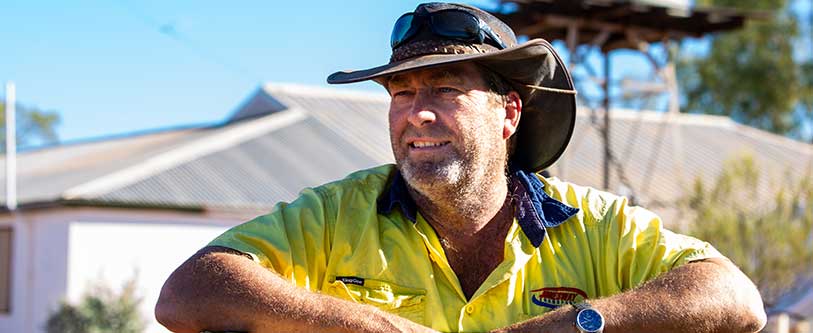Carbon farming: caring for the land, your business and the environment
It’s your business,
and your decisions.

GreenCollar works in partnership with farmers, graziers, traditional owners, and other land managers to design projects that align with your operational goals. With over 200 projects registered around Australia, we know what it takes to combine carbon and farming.
Undertaking an environmental project with us means you get paid for environmental outcomes resulting from land management practices that deliver benefits for your business, as well as the environment. Our projects are designed to enhance agricultural productivity while storing carbon in vegetation and soil, supporting infrastructure upgrades, feral pest management and land regeneration, among other things. And the money that the project brings through the front gate is yours to invest back into your business.
Work with our team of project development and technical specialists who can help you earn a diversified, resilient income stream through carbon farming in Australia.
Introduction to carbon farming
New to carbon farming and not sure where to start? We’ll walk you through the basics, from how it works, eligibility requirements, methodologies, and how projects are measured.
View our carbon projects
Free land carbon assessment
GreenCollar will organise a no-cost, no-obligation assessment of your property’s eligibility and carbon potential. We will provide in-depth and accurate assessments that lead to real results.
Our experienced, local teams provide expert advice on carbon projects and an unmatched understanding of what will suit your land and your business.
Key benefits
Carbon farming projects pay land managers directly for the environmental service of carbon storage or abatement, but there are significant additional benefits that come with each project. A range of environmental, economic and social benefits for landholders, producers, communities and the environment enhance long-term productivity and sustainability of the land.
Additional income from carbon credits allows for further investment in both land and business:
- Financing infrastructure and management changes
- Risk Mitigation
- Improving natural capital and environment
- Investing in local communities
- Water infrastructure and conservation
- improved fencing
- fire management activities
- potential for lower stocking rates
- feral animal and pest control
- ability to afford supplementary feed or de-stock early in adverse conditions.

- Resilient income not reliant on commodity prices or affected by drought/weather
- implementation of closer monitoring and recording to make timely decisions.

- Reducing wind and water erosion
- increasing and maintaining ground cover
- improving soil health and water retention
- higher productivity and improved animal health
- restoring habitat for native flora and fauna
- improving biodiversity and ecosystem connectivity
- reducing impacts of agriculture activities and adverse flow on effects.

- Often providing a second income that can help keep farming families on the land.

Our Management Methods
Anyone wanting to undertake a carbon farming project has to use an approved method. A project methodology sets out eligibility criteria, how the project will be undertaken and how the abatement will be estimated, measured and reported. GreenCollar’s experts work with you to understand your agriculture enterprise and the landscape you operate within to identify suitable methods and design a project that is tailored to suit the land and your operations.
Avoided clearing projects enable landholders in Queensland to break with historical clearing cycles by valuing the protection of native forest within productive agriculture operations. This prevents the destruction of native habitat in one of the most cleared regions in Australia, while storing carbon in native forest as it regrows.

Soil carbon projects require the introduction of new management actions that increase carbon inputs into soil or reduce the loss of soil organic carbon. A range of agricultural activities can be used to build and sequester soil carbon stocks.
These activities may include converting cropland to pasture, renovating pastures, changing grazing patterns or introducing sustainable, productive land management practices. Projects are implemented through a series of modelled scenarios, or through direct measurements, to estimate carbon sequestration over time and produce carbon credits.
GreenCollar partners with leading soil carbon developer Atlas Carbon, to make these projects accessible across Australia’s diverse landscapes and agricultural enterprises.
There are different approaches to soil carbon projects depending on the type of agriculture operation:
- Broadacre Cropping and Horticulture Management
- Grazing Management
Savanna burning projects in the north of Australia deliver sustainable, carbon-sensitive fire management projects that can earn carbon credits by decreasing emissions of methane and nitrous oxide, resulting from intense, uncontrolled wildfires.
These projects aim to reduce carbon, methane and nitrous oxide emissions released by very hot, high intensity wildfires that occur in northern Australia in the late dry season, by carrying out planned, managed burns in the early dry season.
Reforestation by environmental or mallee plantings involves establishing and maintaining vegetation, such as trees or shrubs, on land that has been clear of forest for at least five years. A mix of trees, shrubs and understory species native to the local area, or species of mallee eucalypts, can be planted. These projects store carbon as they grow to reduce the amount of greenhouse gas entering the atmosphere

These projects reward land managers for changes to land management practices that enable native vegetation to achieve forest cover. Project areas must include land that has been cleared at least once for pastoral use, and have potential to achieve forest cover within the project lifetime.
Work with us on a carbon farming project
GreenCollar is one of the only operators in Australia with full end-to-end, in-house expertise in the development, management, legal and technical implementation of carbon projects. We are one of the largest suppliers of nature-based ACCUs to the Australian Government and at the forefront of the voluntary market, actively working to generate new demand for our high quality, high integrity ACCUs.
















